Interview With C.T. Phipps
By: Michael Evan
CT Phipps is an excellent writer. I’ve been a fan of his books since I picked up his first Supervillainy novel “The Rules of Supervillainy”, and found myself laughing hysterically, contemplating deeper things and overcome with emotion all in the same 150 page relatively short work.
Charles is one of those authors that truly goes where the spirit moves him. He refuses to cement himself in one specific genre, so he alternates between Epic Fantasy, Urban Fantasy, Space Opera, Lovecraftian horror and Superhero Satire, all the while giving his readers his distinct style that makes his books so addictive.
A master of sharp, biting humor, Deadpool style fourth wall breaking MCs and social commentary that avoids overt preachiness, Charles Phipps stands out among his peers as an author that has proven to be a genre hopping master of his craft, and extremely prolific, often working on four to five series at one time.
He’s also a philanthropist in the world of Indie speculative fiction, an entrepreneur, and one hell of a nice guy. I had the chance to sit down and talk to Charles about his current projects, future plans and more. Enjoy the interview.
ME: Hey Charles, hows it going? It looks like you’ve got a big year planned in terms of releases. Can you tell us about your master plan for 2019 and beyond?
CP: Current projects for this year:
A. Finish up The Kingdom of Supervillainy (Supervillainy 7#): A story about Gary Karkofsky trying the unthinkable: become a superhero instead of a villain. Unfortunately, Gary is not nearly as good at solving chaos as he is causing it.
B. Finish up the Bright Falls Mysteries Trilogy (a.k.a “Oh Deer Me”): The adventures of Jane Doe weredeer will climax with her facing down a summer camp movie shoot full of movie monsters. It will also have her finally confront the evils afflicting Bright Falls and either resolve them or die in the attempt.
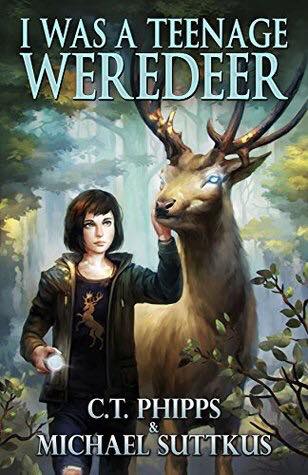
C. Finish up the Red Room trilogy: The Fall of the House will chronicle Derek Hawthorne exposing the supernatural to the world and ending the House’s thousand year reign over humanity. It may cost him his life. This will lead to the transformation of the Red Room series world circa 2008 to the present day United States of Monsters series (Bright Falls Mysteries, Straight Outta Fangton).
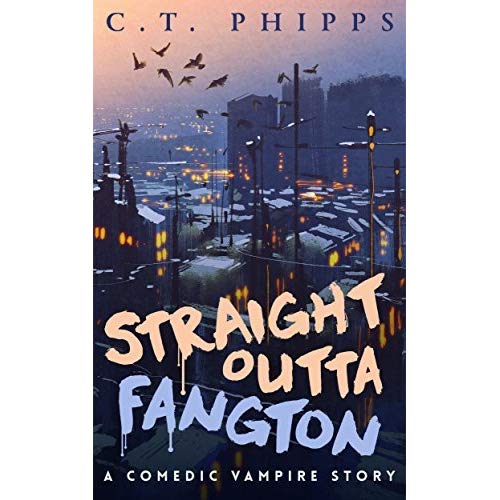
D. Finish up the Straight Outta Fangton trilogy: The finale of Peter Stone’s adventures will be the attempted rescue of his mentor Thoth. A cruel and tyrannical voivode has taken over the city of New Detroit and is running it into the ground. If he’s not stopped then supernaturals will find themselves hunted by the government and the fragile peace with mortals will come to an end.
I’m also collaborating with Michael Suttkus on a book set in the United States of Monsters world called Brightblade but that’s still hush-hush.

ME: The Future of Supervillainy is just about to be released. I was actually slightly surprised and also relieved that you decided to continue Gary’s story after Tournament which felt like this massive “Engame” of a novel so to speak. Can you talk a bit about the tone and themes in the newest instalment without giving too much away?
CP: I find that kind of funny since The Tournament of Supervillainy ended on a cliffhanger. I had originally set to end the series on The Science of Supervillainy. However, Jeffrey Kafer convinced me to continue the series and I’m very glad he did.
ME: Is there an end in sight for Gary? If so do you know how things will turn out for him already or do you suspect it will come to you as you write?
CP: My current plans are to continue it up to twelve books if I can manage it as well as fans continue to buy. I have a rough sketch of Gary’s continued adventures planned out. Gary lives in a comic book universe that is entering the final years of its “Age of Superheroes.” Despite superheroes bashing bad guys since the 1930s, the public has grown weary of the constant battles between good and evil. The problem is you can’t just opt out of the struggle. Some madmen like President Omega plan to eliminate all superhumans while others like the Brotherhood of Infamy want to make everyone normal. The fact this will result in the world being taken over by aliens, monsters, or villains is something only Gary seems to see. He’ll be a key figure in deciding what the next Age looks like. So basically I’m ripping off Tolkien with more pop culture references and none of the talent.
ME: You have mentioned frequently that the Supervillainy series is your biggest commercial success. What is it about Gary and his adventures that you think captures people and hooks them?
CP: I don’t want to say I just got lucky but I just got lucky. It was a perfect storm of the fact that they debuted on Audible during a time when superheroes were at peak popularity and there wasn’t anything really in the market for original superhero literature. That’s since changed with Drew Hayes, Michael Gibson, Peter Clines, and others picking up the slack. Still, I got on the ground floor of a big boom helped along by the MCU. There’s also the fact I had a beautiful cover, a professional narrator with his own following, and appealed to audiences with brain candy they wanted. The Supervillainy Saga is a comedy series that people enjoy to relax their brains. That is a good market to hit.
ME: I notice a fair amount of multitextual ideas in your writing. Kind of like despite the comedy on the surface, you are always digging deeper. Am I reading too much in to this? And if not what major philosophical concepts are important to the overall impact of your novels?
CP: I think Tom Baker (4th Doctor) said the enduring appeal of Doctor Who was that it was a children’s show but not a childish show. Just because something is funny or ridiculous (such as most genre fiction tends to be) doesn’t necessarily mean it’s stupid. Jack Kirby genuinely thought he was pondering the mysteries of the universe with his 4th World comics. Maybe he was. In the case of Gary Karkofsky, I like having a protagonist who ponders the ideas behind heroism and superhero mythology. Similarly, my United States of Monsters stories take place in the “real” world so I can address things like prejudice, social stratification, economic depression, and drug abuse while also making silly vampire references. They’re the kind of books I like and putting those elements in them enrich the story for me.
ME: You have a couple of new anthologies as well. Can you talk a bit about those?
CP: I’m working on Blackest Spells as a sequel to the Blackest Knights anthology I did last year. You can speak more of the charity anthology (Rise Above) I have a short story in that I suggest everyone buy. It’s for a good cause.
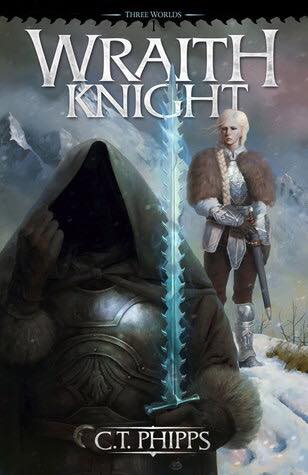
ME:Wraith Knight remains one of my favorite Fantasy novels. I’m about to start Wraith Lord, it’s sequel. What plans do you have for this complex world you have created?
CP: Wraith Knight is meant to be a trilogy like most of my United States of Monsters books or the Lucifer’s Star series. I had the idea of examining Tolkien-esque mythology (there he is again!) and the conflict between good versus evil in a somewhat more serious vein than my Supervillainy Saga books examine superhero stories. Basically, I was thinking about the fact that the Ringwraiths didn’t have free will thanks to the Nine Rings and the orcs were slaves of Sauron themselves. How did the surviving people of Mordor get along with the people of Gondor and Rohan afterward? How would one of those Ringwraiths feel if he got his free will back. I was partially inspired by the Fall of the Soviet Union as the death of Empires and authoritarian government can lead to great chaos, regional conflicts, plus people becoming nostalgic for tyranny.
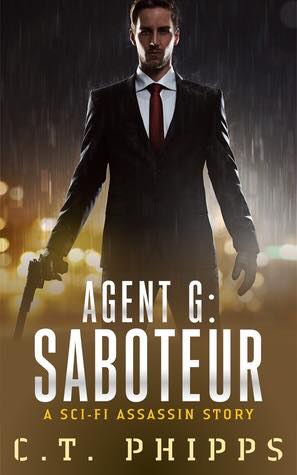
ME: What can Agent G fans look forward to? Are there still a couple of books left in the series?
CP: AGENT G: SABOTEUR was the end of the Agent G trilogy and successfully followed the adventures of G from the “Present” to the cyberpunk future that was promised in the first book. I fully intend to adapt that book to audio. I might yet continue writing the series with a new trilogy set in a cyberpunk world but that’s for the future.
ME: How has it been over at Crossroad Press. Has it been a major transition moving to a publisher? Are there more books that still need to be relaunched? If so when can that be expected?
CP: Crossroad Press is a very effective upper mid-tier publisher with over 2600 books from many famous mainstream authors ranging from Brian Lumley to Clive Barker. I’m honored to be with them and have moved over all of my books. I still have to get some of them out in paperback and audiobook format but that’s in the works.
ME: You clearly enjoy Lovecrafts’s work. What is it about Lovecraftian monsters that you find so compelling? For those that may not have delved in to this side of your writing, can you talk a bit about these projects?
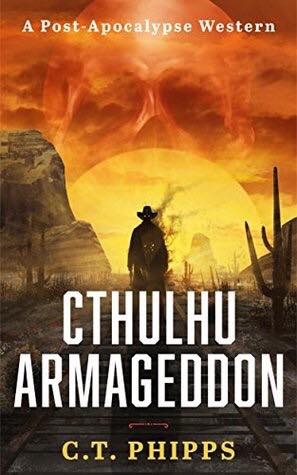
CT: I’m presently writing a series called CTHULHU ARMAGEDDON that is taking its time, maybe one book every couple of years because it’s not a series to take lightly and each book is self-contained. It’s a post-apocalypse series taking place after the destruction of the world by the Great Old Ones. H.P. Lovecraft created a truly amazing bestiary of uncaring alien monstrosities. I think what appeals to me about them is they’re not enemies or evil. They’re just creatures and alien consciousnesses that must be dealt with on their terms rather than humanity.
ME: What have you read recently that you can recommend to our community?
CP: I could be here all day with that but authors I recommend people check out are the following: A.M. Justice, Ulff Lehmann, Rob Hayes, Michael R. Fletcher, Richard Nell, Steve McHugh, Michael Gibson, M.L. Spencer, Martin Owton, Allan Batchelder, Michael Baker, Matthew Davenport, James Alderdice, Luke Hindmarsh, Seth Skorkowsky, and many many more.
ME: You are quite prolific, and always seem to have something new coming out? What’s the key to your prolificacy? Do you find it challenging or does it come naturally?
CP:Being a prolific author depends mostly on having the benefit of being able to find time for your work as well as following your inspirations. I was lucky enough to get a big success with the Supervillainy Saga early on and became a full time writer. Basically, whenever I feel like I have a story to tell, I try to get it down. It means I have a lot of series in the works right now and probably should wrap them up but it has been a boon to me artistically.
ME: What takes up most of your time when you are not writing? What is Charles Phipps the dude, doing when CT is out of the writing cave?
CP: Running errands, eating, researching. There are so many hours in the day. I sometimes make time for tabletop gaming (Vampire: The Masquerade, Mutants and Masterminds) but writing is what I do for fun.
ME: As someone that seems to have a handle on not only the creative, but the entrepreneurial aspects of a writing career , can you offer some advice to writers that are trying to make this their full time business?
CP: Don’t try and make your full-time business at the start. Writing is a marathon not a race. You’re almost certainly not going to be able to quit your day job after your first book or even your fifteenth. It’s a passion that requires you to create, market, and network in order to become successful–and even then what you define as successful may vary by your goals. I know someone who made 10K a month writing porn and someone who made almost nothing writing one of the best books I’ve ever read. But if I have any piece of advice, it’s that you should avail yourself to the advice of other authors and follow in their footsteps. There’s no substitute for experience. Also, investigate any publishers you plan to sign off on with testimonials from their writers and ex-writers.
ME: How important is reader interaction to you? What’s your favorite way to interact with fans of your work ?
CP: I love reader interaction and try to build a relationship with my fans. They appreciate it and are the best way to spread news about your work. They’re the real secret to success.
ME: You have a reputation in the indie community as someone that genuinely cares about helping others. Can you comment on this a bit? What are some of your goals with regards to helping others achieve?
CP: I don’t think authors are competing with each other. When someone likes a book, they usually will pick up another one because they enjoyed the experience of reading. I also feel like if one author succeeds, it’s likely to broaden the fandom of other authors in their genre. Sure, you may eventually run out of book budget but I don’t believe that’s a problem in the long term.
ME: Which series of yours are you the most proud of? Which character is your favorite to write?
CP: Oh, I couldn’t possibly choose. Supervillainy Saga, Bright Falls Mysteries, and Straight Outta Fangton are the easiest to write but Cthulhu Armageddon, Wraith Knight, and Lucifer’s Star are probably my most “serious” books.
ME:Just to wrap up, talk a bit about the big charity paperback giveaway, as well as the charity you’ve chosen to support
CP: Its a giveaway of the entire Supervillainy Saga, so far, signed in order to raise money for the Rainbow Railroad a charity that rescues LGBT from hostile nations.
